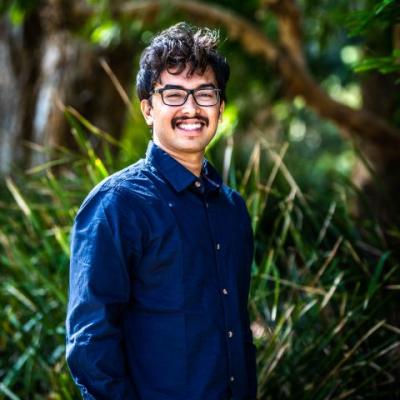
Graduate Certificate in Engineering Science
Overview
Interested in strengthening your capacity to design, develop, and implement complex systems and engineering projects? This program offers flexibility across a range of engineering disciplines, so you can develop your technical expertise in areas specific to your career aspirations.
The Graduate Certificate in Engineering Science is designed for applicants with a background in engineering.
Your future is in industry – as a professional engineer with deeper technical skills in your engineering field.
Program highlights
- Benefit from a program that offers a flexible study plan. Tailor your studies to suit your interests, your industry, or your career goals.
- Students will develop professional engineering skills and technical expertise in their discipline through advanced and master's level courses. You'll graduate with the skills required to solve complex engineering challenges in a changing world.
- Undertake a supervised research project relevant to your engineering field. You'll be expected to systematically plan and manage all aspects of your project, and to clearly explain your findings and what they contribute to your field.
Fields of study
Tailor your studies to suit your goals. This program offers these options:
- Bioprocess Engineering
- Chemical Engineering
- Civil Engineering
- Electrical Engineering
How you'll learn
Your learning experiences are designed to best suit the learning outcomes of the courses you choose.
- Lectures
- Tutorials
- Research experience
- Laboratory work
- Fieldwork
What you'll study
At UQ, degrees are called 'programs' and subjects are called 'courses'.
Graduate salary
Engineering (postgraduate)
compared.edu.au
Events
See all events
29 June - 6 July
Year 11 Queensland Chemistry Winter School

29 June
Queensland Biology Winter School, Year 12

1 July
International Baccalaureate Research Skills Program
Stories
See all stories
Uni life
What’s it like to study resource development (mining) as a postgraduate?
6-minute read

Study tips
5 must-study environment and sustainability courses
8-minute read

Study tips
UQ science scholarships to help fund your studies
8-minute read
Stories
See all stories
Uni life
What’s it like to study resource development (mining) as a postgraduate?
6-minute read

UQ people
From firefighting robots to rocket science: Vennkkata’s UQ experience
5-minute read

Study tips
5 must-study environment and sustainability courses
8-minute read
Entry requirements
Entry requirements
To be eligible for entry, you'll need:
- a 4-year bachelor's degree (or equivalent) in a relevant engineering discipline (see below), or
- to have completed post-secondary studies and 2 years full-time equivalent relevant work experience (see below). Applications based on post-secondary study and/or work experience will be individually assessed.
- a 4-year bachelor's degree (or equivalent) in a relevant engineering discipline (see below), or
- to have completed post-secondary studies and 2 years full-time equivalent relevant work experience (see below). Applications based on post-secondary study and/or work experience will be individually assessed.
Relevant disciplines for previous qualifications
Relevant Disciplines depend on the field of study you intend to choose.
- For the Bioengineering field of study, relevant disciplines include bioengineering, biochemical engineering, bioprocess engineering, chemical engineering, chemical engineering and technology, process engineering.
- For the Chemical Engineering field of study, relevant disciplines include chemical engineering, chemical engineering and technology or process engineering.
- For the Civil Engineering field of study, relevant disciplines include civil engineering, structural engineering or civil and structural engineering.
- For the Electrical Engineering field of study, relevant disciplines include electrical engineering, electrical and electronic engineering, electrical power engineering, electronic engineering, telecommunication engineering, communication engineering or power engineering.
- For the Fire Safety Engineering field of study, relevant disciplines civil engineering, chemical engineering, environmental engineering, mechanical engineering or structural engineering.
- For the Materials and Manufacturing Engineering field of study, relevant disciplines include functional materials, materials engineering, materials science and engineering, or mechanical and manufacturing engineering.
- For the Mechanical Engineering field of study, relevant disciplines include automotive/vehicle engineering, thermal energy and power engineering, mechanical engineering, mechanical and manufacturing engineering, mechanical and aerospace, mechanical and industrial engineering, mechatronic engineering, mechanical and automation engineering or marine engineering.
- For the Mechatronic Engineering field of study, relevant disciplines include mechanical engineering, automation engineering, mechatronic engineering, aeronautical engineering, aerospace engineering, mechanical and manufacturing engineering, mechanical and industrial engineering, or mechanical and automation engineering.
- For the Software Engineering field of study, relevant disciplines include software engineering, computer science.
- For the Urban Water Engineering field of study, relevant disciplines include chemical engineering, civil engineering or environment engineering.
Relevant work experience
Relevant work experience includes professional practice or work in an engineering environment relevant to the field of study, to which you are seeking admission. This will need to be supported with evidence.
Evidence of relevant work experience should include a letter from your employer (and/or previous employers) clearly stating the following:
- That you work (or worked) within the specified organisation
- The nature of your work, detailing any relevant duties and responsibilities to the entry criteria above
- The length of time you were in your role/s (i.e demonstrating minimum length for entry) and whether this was full-time, part-time, or casual
- Any further bespoke conditions listed by the entry criteria
Letters will typically be expected to be presented on company letterhead and signed by a manager or HR representative. A CV or resume is not a sufficient document on its own, and must be accompanied by a supporting letter as described above.
All applications based on work experience are subject to an individual assessment.
Entry into a program through work experience does not necessarily provide a pathway into further study in a Masters.
Related programs
Depending on your previous qualifications and current goals, you might want to consider
one of these related programs:
English language requirements
IELTS overall 6.5; reading 6; writing 6; speaking 6; listening 6. For other English Language Proficiency Tests and Scores approved for UQ
TOEFL iBT (including Paper Edition) - Overall 87, listening 19, reading 19, writing 21 and speaking 19.
PTE Academic - Overall Score of 64 and 60 in all sub bands.
BE - A minimum overall grade of 4 plus a minimum grade of C in all macro skills.
CES - Overall 176 and 169 in all sub bands.
OET is not accepted.
There are other ways to meet the English language requirements. For some programs, additional conditions apply.
Student visas
International students who are accepted into full-time study in the Graduate Certificate in Engineering Science are eligible to apply for an Australian student visa (subclass 500).
There are a number of requirements you must satisfy before a visa is granted, including the Genuine Student (GS) requirement.
Fields of study
Fields of study
Tailor your studies to suit your goals. This program offers these options:
Fields of study
Tailor your studies to suit your goals. This program offers these options:
Fees and Scholarships
Indicative annual fee
Approximate yearly cost of tuition (8 units). Your fees will vary according to your selected courses and study load. Fees are reviewed each year and may increase.
$4,770
2026
Approximate yearly cost of tuition (8 units). Your fees will vary according to your study load. Fees are reviewed each year and may increase.
AUD $29,028
2026
Government assistance
Financial aid
As an international student, you might be eligible for financial aid – either from your home country, or from the Australian Government.
HECS-HELP
Domestic places in the Graduate Certificate in Engineering Science are Commonwealth supported, as long as you meet all Commonwealth supported place eligibility requirements.
This means the cost of your education is shared between you and the Australian Government. Instead of tuition fees, Commonwealth supported students pay what are called student contribution amounts.
If you have a Commonwealth supported place, you may also be eligible for HECS-HELP. This is an Australian Government loan scheme to assist eligible students with the cost of their student contribution amounts.
Centrelink support
The Australian Government offers a number of income-support payments to eligible Australian university students.
Scholarships
You may be eligible for more than 100 scholarships, including:
How to apply
Applying online
All international applications should be submitted to UQ. If you prefer, you can use an approved UQ agent near you.
The program code for the Graduate Certificate in Engineering Science is 5527.
Applying online
All domestic applications should be submitted to UQ.
The program code for the Graduate Certificate in Engineering Science is 5527.
Important dates
The closing date for this program is:
- To commence study in semester 2 - May 31 of the year of commencement.
- To commence study in semester 1 - November 30 of the previous year.
Visa processing times vary. Apply and accept your offer as early as you can.
To learn more about UQ dates, including semester start dates, view the Academic Calendar.
Important dates
The closing date for this program is:
- To commence study in Semester 1 - January 31 of the year of commencement.
- To commence study in Semester 2 - June 30 of the year of commencement.
To learn more about UQ dates, including semester start dates, view the Academic Calendar.
Aboriginal and Torres Strait Islander applicants
For support with applying – or if you have any questions about university life – get in touch with our Aboriginal and Torres Strait Islander Studies (ATSIS) Unit.
Explore other programs
Express yourself. And your interest.
They say choosing a degree is hard, which is why we've made it easy. Register your interest and we'll send you everything you need to know about applying to UQ.


